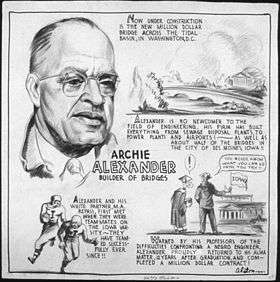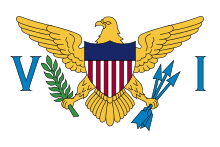Archie Alexander

Archie Alphonso Alexander (May 14, 1888 – January 4, 1958) was an African-American mathematician and engineer. He was an early African-American graduate of the University of Iowa and the first to graduate from the University of Iowa's College of Engineering. He was also a governor of the U.S. Virgin Islands.
Alexander was born in Ottumwa, Iowa, the son of Price and Mary Alexander. When the family moved to a farm outside Des Moines, Price became head custodian at the Des Moines National Bank, which at the time was a prestigious job for a black man. Attending Oak Park Grammar School, Oak Park High School and Highland Park College for one year, Archie began his engineering education at the State University of Iowa (The University of Iowa).[1] "Although he initially went to Des Moines College and attempted to join the white-only American football team there, he was declined. As a result, he played tackle from 1910 to 1912 [at Iowa] and was nicknamed 'Alexander the Great'."[2] During the summer Alexander worked as a draftsman for Marsh Engineers, a Des Moines bridge-designing firm and in 1912, he received a bachelor of science degree, becoming the University of Iowa's first black football player and engineer.[3]
After graduation, Alexander worked as a foreman for a bridge-building company before going into business for himself in 1917. Continuing his education at the University of London, Alexander studied bridge design in and obtained a degree in civil engineering in 1925 from the State University of Iowa.
In 1929, he formed Alexander & Repass, where he would work until his death. They were responsible for the construction of many roads and bridges, including the Whitehurst Freeway, the Tidal Basin Bridge, and an extension to the Baltimore-Washington Parkway. With his business partner, George Higbee, Alexander designed the Tuskegee Airfield and the Iowa State University heating and cooling system.
In 1934, Alexander was appointed as one of a 12-member commission to investigate the social and economic conditions in Haiti. In 1946, he was awarded an honorary Doctor of Engineering by Howard University.
In 1954, Alexander was appointed Governor of the United States Virgin Islands by President Dwight D. Eisenhower. He was the first Republican governor there since the establishment of the civil government. His tenure at the post was short and controversial. In 1955, he was highly criticized for favoring old business partners in contracts for road building on St. Thomas. The United States House of Representatives launched a probe and he subsequently resigned on August 18, 1955, ostensibly for health reasons. He died in 1958 in Iowa. Alexander was also a member of Kappa Alpha Psi fraternity.
The Archie Alphonso Alexander Papers are held at the University of Iowa Special Collections & University Archives.
Non-recipient of the Spingarn Medal
Some sources, including Alexander's obituary in the New York Times, incorrectly credit him as winner of the NAACP's Spingarn Medal in 1928. The award went to author Charles W. Chesnutt; Alexander never received one.
References
- ↑ Wilson, Dreck Spurlock (2004). African-American Architects : A Biographical Dictionary 1865–1945. New York, NY 10001: Routledge. pp. 11–12. ISBN 0-415-92959-8.
- ↑ Wilson, Dreck Spurlock (2004). African-American Architects : A Biographical Dictionary 1865–1945. New York, NY 10001: Routledge. pp. 11–12. ISBN 0-415-92959-8.
- ↑ Wilson, Dreck Spurlock (2004). African-American Architects : A Biographical Dictionary 1865–1945. New York, NY 10001: Routledge. pp. 11–12. ISBN 0-415-92959-8.
External links
- The National Society of Black Engineers
- Infoplease Archibald Alphonso Alexander
- The Archie Alexander Papers are housed at the University of Iowa Special Collections & University Archives.
| Preceded by Morris Fidanque de Castro |
Governor of the U.S. Virgin Islands 1954–1955 |
Succeeded by Charles K. Claunch Acting-Governor |
